
A point, whether of an idea, joke or tapered object, is always arrived at in the immediate. You get the point when you get the point. Even if you don’t get the point right away, when you do get it, you get it at a precise moment.

In the game of darts you get points by getting the point of your dart to stick to a point aimed at, but over and above the mechanics of the game the real point is to enjoy it.
But why? Why do we enjoy what we do?

Science says that enjoyment is a matter of brain chemistry. A characteristic of people with depression and mental illness is anhedonia: an inability to gain pleasure from normally pleasurable experiences.

Brain expert Dr. Stuber PhD might say (and did), “GABA neurons located in the VTA are just microns away from dopamine and are negative regulators of dopamine function… A dysfunction in these GABA neurons might potentially underlie different aspects of neuropsychiatric illness, such as depression” (UNC Healthcare).
Psychologists treat happiness as if it’s mysterious. They recommend working on a meaningful career, spending time with friends, savoring the day and so on, but happiness doesn’t come from outside.
Assuming your GABA neurons aren’t buzz-killing dopamine release, there are as many ways to enjoy as there are people but it boils down to one thing: We enjoy what we enjoy (because we enjoy it).
It’s circular – like Donna Summer singing, “Love to love you baby.”

X is true because of Y. Y is true because of X. We dance because it’s enjoyable. It’s enjoyable because we dance. We play to have fun and have fun when we play. If we’re forced to play, it isn’t play anymore. It’s emotion first, then realization and confabulation.

If the point of enjoyment is to enjoy, the question is: What is the meaning of true enjoyment? This was asked in Quora (a question-and-answer site) and people responded. (Note: names have been changed to protect the anonymous).
Tommy said enjoyment is, “Celebrating life, not one’s life; just life!” Dieter said enjoyment is, “Living the moment.”

Sally listed enjoyments: “Looking at the smile of a new born baby. Eating Mango by plucking and stealing it from an orchard. Getting wet in rain without bothering about getting wet.”

Simon said, “Everyone has different meaning of enjoyment! They have different source of enjoyment but for me … it’s something which I do for myself!”
And there it is.
Maybe there’s a little Simon in all of us. There’s just something about one’s self that makes it special to one’s self. To you, there’s no you quite like you.
Psychologists say it’s good to love one’s self. Why, if there was no you – no you as a living organism with thoughts and feelings in an environment – there would be…what?

But vain self-importance blocks the flow of enjoyment like crimping a garden hose. When things don’t go the way we want, we’re unhappy so the trick is to loosen up and enjoy what you get (see post: Is it serious?).
 We have a limited idea of who we are. Yes, we are each a bag of skin crowned by a cranium, but do we end in skin? What about air in lungs and energy from the sun in our bellies? Going into atoms we see nothing there – just energy waves. We’re energy waves. Not that this matters when you stub your toe, but a “hard” world is softened with a realization of how interconnected and diaphanous (light and insubstantial) this all is.
We have a limited idea of who we are. Yes, we are each a bag of skin crowned by a cranium, but do we end in skin? What about air in lungs and energy from the sun in our bellies? Going into atoms we see nothing there – just energy waves. We’re energy waves. Not that this matters when you stub your toe, but a “hard” world is softened with a realization of how interconnected and diaphanous (light and insubstantial) this all is.
Philosopher Alan Watts saw interconnections, saying, “where there are no flowers there are no bees, and where there are no bees there are no flowers. They’re really one organism” (Conversation With Myself).

A dandelion seed has fine hairs allowing it to ride on the wind. The wind is, in a manner of speaking, a part of itself. Why do advertisers associate their product with love and happiness? It isn’t the product in itself that we want: it’s the feeling the product is said to impart.
 What you love is what you enjoy. Enjoyment is a one step process: Express love for something and you are happy.
What you love is what you enjoy. Enjoyment is a one step process: Express love for something and you are happy.
Author of The Element (2009), Ken Robinson, said, “To be in your element you have to love it… Being good at something is not a good enough reason to do it…It’s about finding the thing that resonates within you most fully” (see Ken Robinson video).
There’s a little verse from an ancient Hindu text called the Rig Veda that tells of the tree of life and two birds. One bird eats the tree’s fruit (some good some bad) and the other watches. They represent two aspects of ourselves. We are the bird eating – we participate in the action of life (killing and eating), experiencing joy and sorrow – but in contemplation, we are the second bird who watches. The trick is to be aware of the second bird watching the first bird participating.

You walk into a forest and suddenly you are struck by the wonder of this place. You feel the mystery of being and life itself. A cedar waxwing flies by. That such a creature should be there! That the universe should be here! That’s something that excites you to wonder. Take a deep breath and simply enjoy (see also: The Point of Enjoyment 2).
 You’re up before the sun “working in a coal mine, going down down,” and someone says, “Lord! I am soooo tired. How long can
You’re up before the sun “working in a coal mine, going down down,” and someone says, “Lord! I am soooo tired. How long can  But few people see signs these days and those who do are maligned. We might crave a vision but all we have is TV. It’s not because the signs aren’t there that we don’t see them.
But few people see signs these days and those who do are maligned. We might crave a vision but all we have is TV. It’s not because the signs aren’t there that we don’t see them.


 No sooner do you have this realization when you see a sign. But it isn’t the sign that catches your attention. It’s the sign spinner. Stopped at a streetlight, you watch the sign spinner. Suddenly life doesn’t seem so bad.
No sooner do you have this realization when you see a sign. But it isn’t the sign that catches your attention. It’s the sign spinner. Stopped at a streetlight, you watch the sign spinner. Suddenly life doesn’t seem so bad. What you thought was going to be “one of those days” changes into something beautiful when you open yourself to connection and possibility.
What you thought was going to be “one of those days” changes into something beautiful when you open yourself to connection and possibility. Jump forward: now you’re in a lab cubicle waiting for a nurse to take your blood. You’re listening to the Moody Blues sing “
Jump forward: now you’re in a lab cubicle waiting for a nurse to take your blood. You’re listening to the Moody Blues sing “

 There are men at the next table yelling. Humphrey leans close. “Look at them,” he says. (Marcus complies.) “As long as they are busy and entertained, they will be good but tonight these men will drink and look for a fight. Why? Boredom! And why? Because life has no meaning.”
There are men at the next table yelling. Humphrey leans close. “Look at them,” he says. (Marcus complies.) “As long as they are busy and entertained, they will be good but tonight these men will drink and look for a fight. Why? Boredom! And why? Because life has no meaning.” Marcus holds up a flower. Men at the next table mimic. “What is this?” asks Marcus. A flower, thinks Humphrey. “Is this flower a thing?” Yes. It is a thing (weed actually). “What is a thing?” A thing is an object. “Am I a thing?” No. You are a man. “Why am I not a thing and this flower is?”
Marcus holds up a flower. Men at the next table mimic. “What is this?” asks Marcus. A flower, thinks Humphrey. “Is this flower a thing?” Yes. It is a thing (weed actually). “What is a thing?” A thing is an object. “Am I a thing?” No. You are a man. “Why am I not a thing and this flower is?” “What is the meaning of this thing?” asks Marcus of the flower. It has no meaning. “Would you agree that the purpose of this flower is to flower?” Possibly. “Could the meaning of a bird be that it birds?” Birds bird. Flowers flower. You, you. I get it. “Does not a blue sky mean what it is?” Humphrey isn’t sure. “The trouble is that we word the world. We think ourselves separate. We thing it, or, ‘thing-K’ it.” Marcus emphasizes the hard K sound.
“What is the meaning of this thing?” asks Marcus of the flower. It has no meaning. “Would you agree that the purpose of this flower is to flower?” Possibly. “Could the meaning of a bird be that it birds?” Birds bird. Flowers flower. You, you. I get it. “Does not a blue sky mean what it is?” Humphrey isn’t sure. “The trouble is that we word the world. We think ourselves separate. We thing it, or, ‘thing-K’ it.” Marcus emphasizes the hard K sound. “When we were children, the world was what I’d call spiritual. We didn’t name. We didn’t categorize. We didn’t analyze. We enjoyed. One star was not better than another. We ran around without thinking, ‘Why are we running around?’ It’s like we were in Eden – not the Biblical place – but the feeling of delight, contentment, happiness
“When we were children, the world was what I’d call spiritual. We didn’t name. We didn’t categorize. We didn’t analyze. We enjoyed. One star was not better than another. We ran around without thinking, ‘Why are we running around?’ It’s like we were in Eden – not the Biblical place – but the feeling of delight, contentment, happiness
 BAM! Two tankards of ale are slammed onto the table by a beautiful barmaid. They pick up their drinks and enjoy as a musician plays
BAM! Two tankards of ale are slammed onto the table by a beautiful barmaid. They pick up their drinks and enjoy as a musician plays 
 The feeling within Humphrey switches from boredom to…. a feeling of
The feeling within Humphrey switches from boredom to…. a feeling of  Humphrey and Marcus finished their ale and parted. Humphrey said he’d never forget being intensely aware. He thanked Marcus for pointing out the obvious and for showing him how to enjoy. A few days later, Humphrey died of an abscessed tooth.
Humphrey and Marcus finished their ale and parted. Humphrey said he’d never forget being intensely aware. He thanked Marcus for pointing out the obvious and for showing him how to enjoy. A few days later, Humphrey died of an abscessed tooth.

 A world view is how truth and reality is understood. It
A world view is how truth and reality is understood. It 



 Instead of three bears, picture three brains inside your skull like neuroscientist Paul MacLean (1913-2007) said there was.
Instead of three bears, picture three brains inside your skull like neuroscientist Paul MacLean (1913-2007) said there was. The neo-mammalian (or neocortex) is the seat of perception and imagination. Whether religious or not, the three brains theory allegorically explains why people think and do what they think and do do.
The neo-mammalian (or neocortex) is the seat of perception and imagination. Whether religious or not, the three brains theory allegorically explains why people think and do what they think and do do. Lower brains are said to be instinctive. Their concern is with reproduction and dominance, sometimes necessitating deception and violence.
Lower brains are said to be instinctive. Their concern is with reproduction and dominance, sometimes necessitating deception and violence. But in rare moments, when there are no demands put upon us, when one is quiet and comfortable, in such a peaceful interval, we are free to enter a higher mental state. When released from pride, ambition and self-justification, one looks at others not with criticism and judgement, but with a realization.
But in rare moments, when there are no demands put upon us, when one is quiet and comfortable, in such a peaceful interval, we are free to enter a higher mental state. When released from pride, ambition and self-justification, one looks at others not with criticism and judgement, but with a realization.












 Jean-Dominique Bauby (1952-1997) was an editor of ELLE magazine. At 43 he had a stroke that left him paralyzed from head to toe. Despite Bauby’s feeling of being under water and weighted down like a deep sea diver, in his memory and imagination, he was light and free like a butterfly.
Jean-Dominique Bauby (1952-1997) was an editor of ELLE magazine. At 43 he had a stroke that left him paralyzed from head to toe. Despite Bauby’s feeling of being under water and weighted down like a deep sea diver, in his memory and imagination, he was light and free like a butterfly.


 Scientists can explain the mechanics of eyeballs: how they function and how to fix them, but in terms of perception – the link between world “out there” as taken in by eyeballs, and the mind’s interpretation of that world – science can’t say.
Scientists can explain the mechanics of eyeballs: how they function and how to fix them, but in terms of perception – the link between world “out there” as taken in by eyeballs, and the mind’s interpretation of that world – science can’t say. Think about what you see. As you walk, arms not swinging, looking at your feet, eyes glazed like donuts, imagine that you’re in a silent helicopter or a
Think about what you see. As you walk, arms not swinging, looking at your feet, eyes glazed like donuts, imagine that you’re in a silent helicopter or a 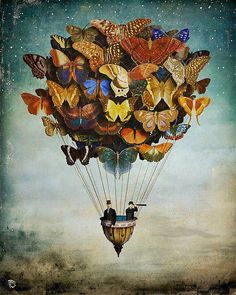 We each think of ourselves as a subject in a world of objects. We think we have an inner stream of consciousness that babbles, sometimes turbulent, sometimes calm, but are you in the stream, the stream itself or the one looking at the stream?
We each think of ourselves as a subject in a world of objects. We think we have an inner stream of consciousness that babbles, sometimes turbulent, sometimes calm, but are you in the stream, the stream itself or the one looking at the stream?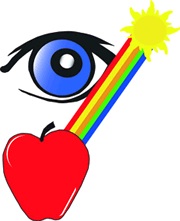 Science tells us we perceive only reflected colours. Red is not “in” an apple. An apple reflects wavelengths that we see as red with our light receptors. Our eyes and brain together “translate light into colour” (
Science tells us we perceive only reflected colours. Red is not “in” an apple. An apple reflects wavelengths that we see as red with our light receptors. Our eyes and brain together “translate light into colour” ( There is a double vision between self and situation. Inside and outside are two sides of one coin. You see through a massive window, not as a thing inside. The world out there comes inside with each step you take forward.
There is a double vision between self and situation. Inside and outside are two sides of one coin. You see through a massive window, not as a thing inside. The world out there comes inside with each step you take forward. And, like a peeping fuzzy duckling, your life is nature’s music without notation.
And, like a peeping fuzzy duckling, your life is nature’s music without notation.
 1) It’s silly. You can enjoy yourself sometimes and on occasion, but every day? Even billionaires have bad days.
1) It’s silly. You can enjoy yourself sometimes and on occasion, but every day? Even billionaires have bad days.


 The trick is to combine seeing, smelling, hearing, tasting and touching without preconceived notions of who you think you are as an object (
The trick is to combine seeing, smelling, hearing, tasting and touching without preconceived notions of who you think you are as an object (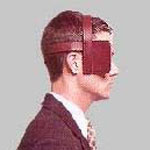 In this philosophy there is nothing to believe. It’s all an experience. It’s a matter of taking off blinders. You can enjoy every day better than any billionaire burdened by big stuff. All it takes is a shift in perspective from what you look at to what you look from.
In this philosophy there is nothing to believe. It’s all an experience. It’s a matter of taking off blinders. You can enjoy every day better than any billionaire burdened by big stuff. All it takes is a shift in perspective from what you look at to what you look from.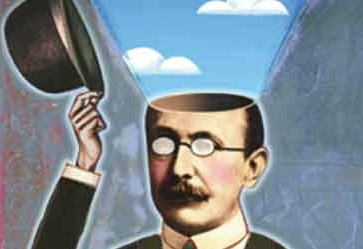 Let’s say you’re washing dishes. While your hands work, you see a sunbeam shine on the table, you see a brown leaf blown across bricks out the window, you hear a distant train. Such contemplation of smell, sight and sound occupies about three-quarters of our life while action occupies about a quarter of conscious awareness.
Let’s say you’re washing dishes. While your hands work, you see a sunbeam shine on the table, you see a brown leaf blown across bricks out the window, you hear a distant train. Such contemplation of smell, sight and sound occupies about three-quarters of our life while action occupies about a quarter of conscious awareness. In “
In “
 You see your breath in the air and ask: “Who are you?” Who but you would know? Why not look into what it’s like being you – first person, singular, present tense? “Would you want to live and die without looking at the one doing that?” asked Douglas Harding.
You see your breath in the air and ask: “Who are you?” Who but you would know? Why not look into what it’s like being you – first person, singular, present tense? “Would you want to live and die without looking at the one doing that?” asked Douglas Harding.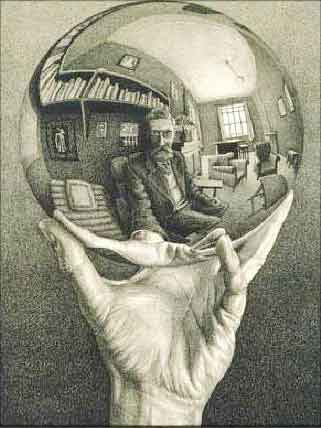


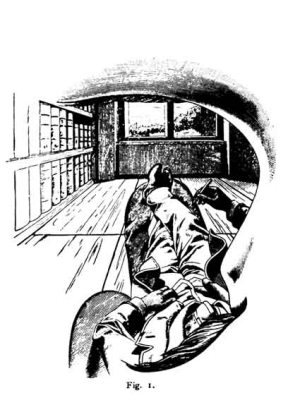
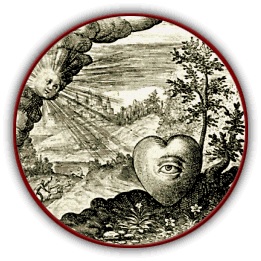 In the 1600’s Traherne wrote, “You never enjoy the world aright, till the Sea itself floweth in your veins, till you are clothed with the heavens, and crowned with the stars.” Traherne was a philosopher of enjoyment. He wrote, “Your enjoyment of the World is never right till every morning you awake in Heaven” (Centuries of Meditation). Wade (1944) writes of Traherne, “In the middle of the seventeenth century, there walked the muddy lanes of Herefordshire and the cobbled streets of London, a man who had found the secret of happiness… He became the most radiantly, most infectiously happy mortal this earth has known” (p. 2). This is the secret: It is in paying attention without thinking. Don’t be fooled by personality.
In the 1600’s Traherne wrote, “You never enjoy the world aright, till the Sea itself floweth in your veins, till you are clothed with the heavens, and crowned with the stars.” Traherne was a philosopher of enjoyment. He wrote, “Your enjoyment of the World is never right till every morning you awake in Heaven” (Centuries of Meditation). Wade (1944) writes of Traherne, “In the middle of the seventeenth century, there walked the muddy lanes of Herefordshire and the cobbled streets of London, a man who had found the secret of happiness… He became the most radiantly, most infectiously happy mortal this earth has known” (p. 2). This is the secret: It is in paying attention without thinking. Don’t be fooled by personality.

 On a cold winter’s night long ago an old man sits happy by a fire. He enjoys warming himself after a difficult day and realizes with surprise how fantastic he feels.
On a cold winter’s night long ago an old man sits happy by a fire. He enjoys warming himself after a difficult day and realizes with surprise how fantastic he feels.
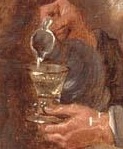 As he pours wine for he and his friend, the old man realizes that the whole struggle he’s had has always been between himself and the pressure of his experience to enjoy or not enjoy life. That is the battle we all wage, but now he knows that there is no need for such a struggle to prevent him from enjoying life because he can enjoy the struggle itself!
As he pours wine for he and his friend, the old man realizes that the whole struggle he’s had has always been between himself and the pressure of his experience to enjoy or not enjoy life. That is the battle we all wage, but now he knows that there is no need for such a struggle to prevent him from enjoying life because he can enjoy the struggle itself! The old man who earlier saw without seeing now disappears in seeing! He no longer is in a room with a friend and a fire as a cold wind blows outside. He is the room! He is his friend! He is the fire! He is the cold wind that blows up to the stars! The old man has broken free! In this act of imagination he feels no separation.
The old man who earlier saw without seeing now disappears in seeing! He no longer is in a room with a friend and a fire as a cold wind blows outside. He is the room! He is his friend! He is the fire! He is the cold wind that blows up to the stars! The old man has broken free! In this act of imagination he feels no separation. Nothing hurts. Nothing disturbs. He smells the smoke and hears the stew simmer. He feels the weight of his beautiful hat on his head. He touches his shirt with gnarled fingers and feels nothing but love for all that is and was.
Nothing hurts. Nothing disturbs. He smells the smoke and hears the stew simmer. He feels the weight of his beautiful hat on his head. He touches his shirt with gnarled fingers and feels nothing but love for all that is and was. Poet John Keats (1795-1821) called it “the empathic entrance into essence.” He writes in
Poet John Keats (1795-1821) called it “the empathic entrance into essence.” He writes in 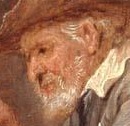 Without imagination and attention our senses are filtered through self-thought. Every “thing” is a “think.” Thought can distract us from the enjoyment of living in the same way that looking down texting on an iPhone as we walk can take us unknowingly into the path of an oncoming truck!
Without imagination and attention our senses are filtered through self-thought. Every “thing” is a “think.” Thought can distract us from the enjoyment of living in the same way that looking down texting on an iPhone as we walk can take us unknowingly into the path of an oncoming truck!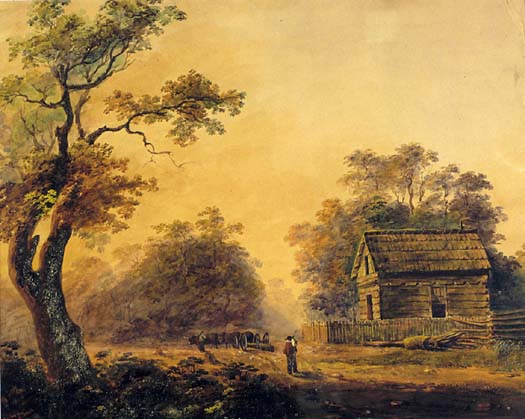
 While he was scuba diving Black probably did lose his mind, not to madness, but to a beautiful feeling when there’s nothing in it but the beauty of being in the beauty of what’s all around. When inner talk runs between wanting and not-wanting, and liking and disliking is stopped—particularly in a natural setting—we can feel aware of beauty in the outside world and enjoy it like nothing else.
While he was scuba diving Black probably did lose his mind, not to madness, but to a beautiful feeling when there’s nothing in it but the beauty of being in the beauty of what’s all around. When inner talk runs between wanting and not-wanting, and liking and disliking is stopped—particularly in a natural setting—we can feel aware of beauty in the outside world and enjoy it like nothing else. 

 Enjoyment can be conscious – as in, you consciously choose to read this – or unconscious – as in, you feel something without knowing why.
Enjoyment can be conscious – as in, you consciously choose to read this – or unconscious – as in, you feel something without knowing why.

 When you enjoy, you become as a poet.
When you enjoy, you become as a poet.